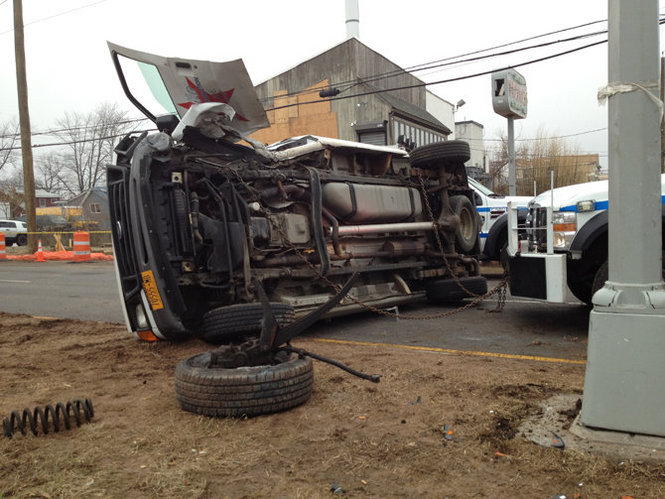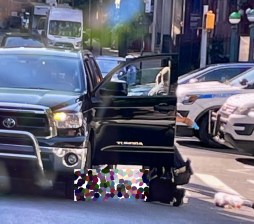CARNAGE CONTINUES: Bloody Year on NYC Streets on Pace for Worst Ever Under ‘Vision Zero’ De Blasio

The summer fireworks aren’t only in the air.
At least 120 people have been killed so far this year on New York City roads — 61 of them pedestrians — a total death toll that is close to 50 percent higher than the same time last year and represents the highest number of fatalities through June 21 of any year in the de Blasio administration. The 11 cyclists and e-bike/scooter riders who have been killed thus far this year is also a recent high.

Mayor de Blasio said the latest numbers were “really troubling” and “sad,” but he suggested that the city’s most vulnerable road users would have to wait for improvements because the NYPD is focusing on other priorities.
“This will all be worked through — I know it will,” the mayor said of the death toll. “Vision Zero works. … But Vision Zero also requires more and more enforcement by the NYPD. The NYPD had to move a lot of resources into dealing with a whole host of other challenges that came up from COVID, including the gun violence problem. As we knock down violent crime, we are going to shift resources back to things like Vision Zero more and more.”
Advocates were stunned that the mayor — after seven-plus years of Vision Zero — still sees the NYPD as a critical part of the Vision Zero initiative, despite its very minor role in ticketing reckless drivers and cracking down on speeding compared to the growing automated enforcement system.
“His comment makes me think of importance of physically and permanently redesigning streets for safety,” said Cory Epstein, the spokesman for Transportation Alternatives, which pointed out that last weekend was particularly bloody. “It is more effective, more economical, more fair, and more safe to do that rather than relying individual officer enforcement. That’s why we constantly beat the drum on investment in concrete, permanent street redesigns.”
De Blasio certainly touted the efforts that his Department of Transportation will made in the mayor’s last six months in office, including beginning major infrastructure projects in Williamsburg, on Queens Boulevard and in the Bronx, and said that the pandemic recovery will naturally reduce road violence because transit use will, eventually, fully rebound (it’s roughly half of what it was pre-pandemic, but rising).
“People turned back to their cars in this pandemic and then they started driving recklessly and that’s unacceptable,” de Blasio said. “People will start getting out of their cars. They will go back to mass transit and the recovery will help address this. But it’s been horrible.”
DOT Commissioner Hank Gutman called the increase in reckless driving an “epidemic.”
“It is not unique to New York,” he said. “It is happening all over the country.”
Gutman added that DOT would be “working with our partners in the NYPD on enhanced enforcement.”
In fairness to the mayor, the NYPD has indeed been out of sight on Vision Zero so far this year. According to the agency’s own statistics, NYPD cops:
- Have written only 12,671 failure-to-yield tickets through May 31 this year, compared to 22,587 through May last year, a decrease of 80 percent. This year’s numbers mean that the average precinct is writing just one failure-to-yield ticket per day. And this year’s numbers are also down from the more-normal, pre-pandemic period in 2019, when 27,173 failure-to-yield tickets were written (though that only means an average of two failure-to-yield tickets per precinct per day).
- Have written only 48,648 red light tickets, down from 69,238 over the same period last year, a decrease of 42 percent. This year’s numbers mean cops are writing just four red light tickets per precinct per day.
- Have written only 48,384 tickets for speeding (again, just about four per precinct per day), down from 70,456 in the same period last year, a decrease of 45 percent.
- Have written only 753 tickets to truck drivers for being off a designated truck route, down from 1,818 over the same period last year, a decline of 141 percent.
Meanwhile, so far this year, not only the death count is up. According to the NYPD:
- Collisions with injuries are up 19 percent so far this year, with 14,709 such crashes.
- Total injuries from those crashes is up 20.5 percent.
- Injuries to cyclists are up 36 percent. So far this year, 1,876 cyclists have been injured.
The NYPD did not immediately respond to a request for comment.
Update: After initial publication of the story, NYPD spokesman Sgt. Edward Riley sent over this statement:
The NYPD has a finite number of resources, and the Department continually employs precision policing to traffic enforcement as a means to safety. During 2020, officers were assigned to patrol precincts to address specific violence related conditions as well as being assigned to incidents of civil unrest. In order to address the spike in gun violence, the NYPD implemented a temporary transfer of police officers from various units, including the Transportation Bureau, to the “Summer All-Out Violence Reduction initiative.” This was coupled with the assignment of members of the Transportation Bureau to the Bronx Violence Reduction initiative.
However, protecting our most vulnerable road users is at the core of the NYPD’s traffic safety plan. The NYPD has been and continues to be, laser focused on combating dangerous driving behaviors, most notably drivers that speed and drivers that fail to yield to pedestrians and cyclists. The data has shown that over 57 percent of pedestrians are being struck by vehicles at intersections and as a result, the NYPD has doubled down on educating our motorists and conducting enforcement when the right of way is violated.
Despite the reassignment in personnel the NYPD continues to conduct Vision Zero traffic safety initiatives citywide each month. These initiatives include the Vision Zero High Visibility Enforcement corridors, the Bicycle and Pedestrian Safe Passage initiatives, as well as having our Highway Patrol officers focusing on speed and impaired driving during hours of darkness when it is most prevalent. In addition, a relevant example of this is our enforcement against speeding motorists; despite a drop in the overall summons enforcement, we are able to maintain a significant enforcement level against speeding motorists which was national trend that began during the pandemic and continues to this day.
